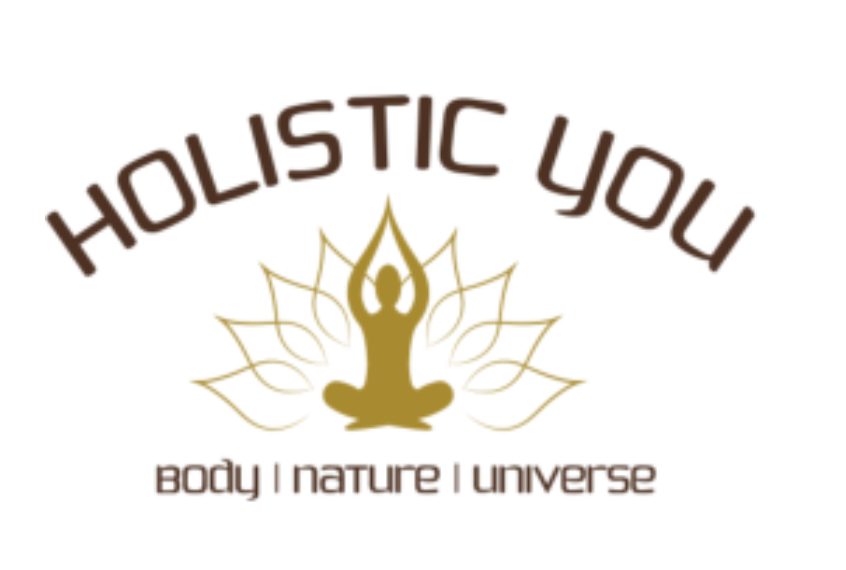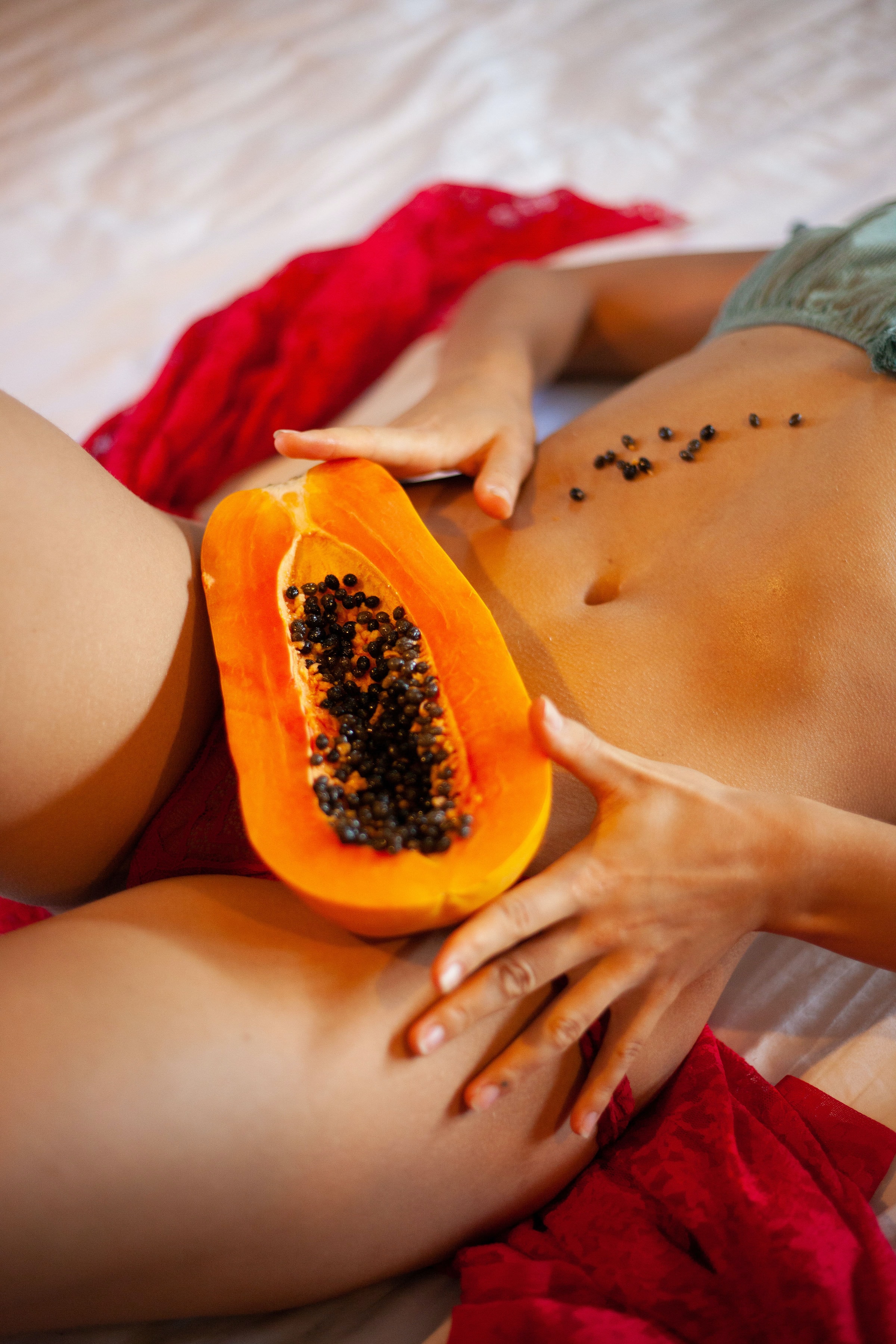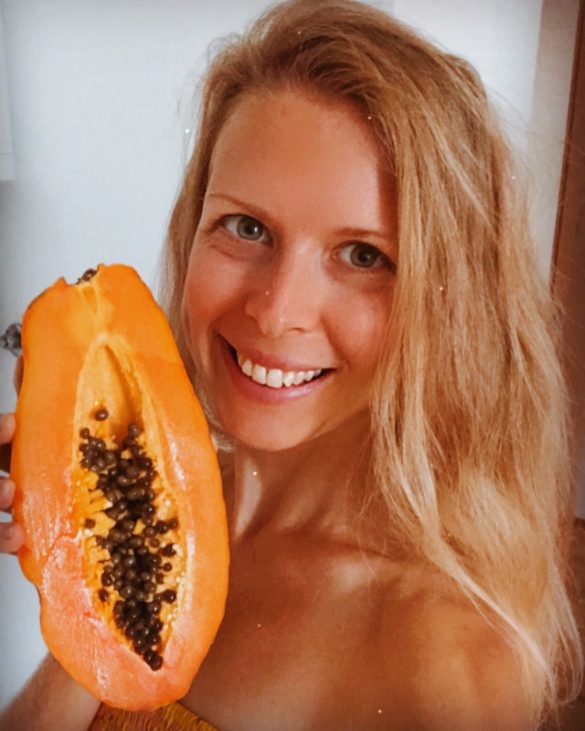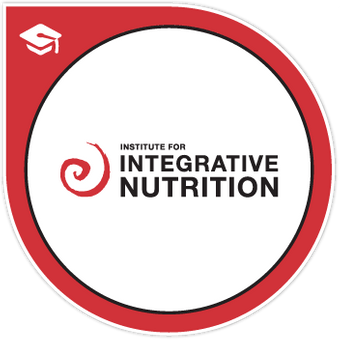A warm welcome, beautiful!
Gut Health. Digestion. Elimination. – Barely anyone enjoys talking about it. I truly desire to break this taboo around such an important topic, because everyone is dealing with it and your gut health is an inseparable part of your overall health and wellbeing.
When it comes to nutrition and eating, everyone’s on board. What diet are you’re on? What’s the recommended number of fruits and veg we should eat per day? How much and when to eat? What do you put on your plate? – Food and eating are hot topics in our society. However, what is equally as important as the food we eat is how we digest, absorb, and eliminate it. Not only does it matter what you put in your precious vessel; but it matters even more what your body does with the chewed and swallowed food on the inside.
“Happiness for me is largely a matter of good digestion.”
(Lin Yutang)
I couldn’t be more passionate about this topic, simply because I myself have been through a lot of discomfort when it comes to digestion.
If you haven’t experienced digestive issues yet, you may ask yourself: What are some signs of an unhealthy gut? Although the more obvious ones are related to the digestive tract itself, also other health issues, like a low immune system, autoimmune diseases etc., can be related to improper digestion, absorption, and elimination.
Whether you struggle with digestion or not: These 5 holistic tips for your gut health can help anyone. However, these information are just some general guidelines and do not replace medical advice. If you’re suffering from chronic digestive problems, I invite you to see a medical professional who’s specialized in this area.
Are you ready to break this taboo topic? 🙂
~ 1. Your Relationship with Food ~
 You’re probably familiar with my holistic approach to life. And you might know about the powerful impact that your mind has – over your life as well as your body. In fact, it can literally ‘control’ and influence your body’s physiology – tremendously.
You’re probably familiar with my holistic approach to life. And you might know about the powerful impact that your mind has – over your life as well as your body. In fact, it can literally ‘control’ and influence your body’s physiology – tremendously.
Everything starts within: Your thoughts create a certain vibration which generate emotions in your body. These emotions (=“energies in motion”) influence you physiology. When you eat, you interact or build a relationship with your food. In fact, what you eat becomes who you physically are. And we can go even further: On the most subtle level, your food is nothing but energy which influences the subtle energy of your mind.
The way you think about your food affects the way your food becomes digested, absorbed, and eliminated. Of course, it also happens the other way round (what I’m describing in the next paragraph, “Your food”). However, your mental and emotional state is a major determinant when it comes to processing your food.

If you choose to eat in a rush, on the go, if you’re distracted while eating – meaning, you’re not fully present with the food and your body –, it is highly likely that you will experience digestive discomfort. Neither are you honoring the food, nor your body. Same happens when you have a distorted relationship with your food and/or body. Whether you believe food makes you gain weight or lose weight or cause digestive stress – it is likely to happen. Because remember: your mind is that powerful!
However, when having a healthy, loving relationship with food, you choose what nourishes and nurtures your body, mind, and soul on a deep level. In this case, eating is an act of self-love. If you pick and prepare your food with gratitude and unconditional love, you will experience that the food literally loves you back. If you take enough time to eat your food, chew it well, and enjoy every bite, texture, and flavor, then it is highly likely that you will digest, assimilate, and eliminate it smoothly.
~ 2. Your Food: Simple Meals & High Variety of Plants ~
After we’ve talked about your mental and emotional relationship with food, let’s move on to the physicality and physiology of our food and body. Whenever the digestive tract is suffering, it is highly likely that it is linked to what we put in it.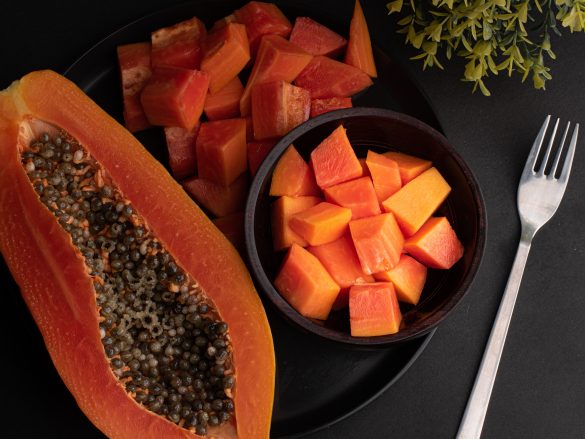
First and foremost, I recommend giving your body what nature has intended it to eat: plant foods in their most natural, unprocessed, unrefined form. Not only do whole plant foods contain a big variety of nutrients, phytonutrients, and fiber which supports digestion a lot; but fresh fruits, veggies and other plant foods connect you with the earth (element), with nature, and your own body which is part of nature. Thus, the benefits of eating plants affect you on a physical as well as more subtle (mental, emotional, spiritual) level. If you seek for optimal digestion, you want to avoid (highly) processed, factory foods which contain lots of refined sugar, refined fats, and artificial ingredients. These foods tend to disconnect you from your body, nature, and the elements.
In general, eating a broad variety of plants will feed a great variety of good gut bacteria. So, the more different fruits, veggies etc. you eat, the more (good) bacteria you feed. If you have a sensitive gut, you can try eating very simple meals at a time, having one to four ingredients per meal. The less ingredients you eat in one meal, the easier it is to digest. You may also want to consider food combining. One of the main things to pay attention to is eating fruits when they are fully ripe and only by themselves. Because fruits are high in water content and simple carbohydrates, they digest very easily and quickly. They literally want to move through your digestive tract. On the other side, more complex, fatty, and high-protein foods take more time and effort to digest. When combined (e. g. melons and kale salad with olive oil), you can experience gas and bloating. You may also want to consider irritants, like sugar, gluten, dairy, soy, corn, and eggs.
~ 3. Feed & Support your microbiome ~
As I mentioned before, eating a variety of plant foods allows your gut microbiome to flourish, because those healthy bacteria thrive on fiber. What they do is digesting these molecules (which are indigestible for the human digestive enzymes) and transform them into short chain fatty acids, i.e. butyrate, acetate, and propionate. These molecules feed your colon cells, they lower and pH in your large intestine, and therefore inhibit the production or growth of potentially harming substance or microbes (Venegas et al., 2019).
When eating fresh organic whole plant foods (fruits, vegetables, and leafy greens) picked right from the earth, without washing them, you may take in some microbes that sit right on your food. When you soak, sprout, and then eat nuts/seeds/beans/whole grains/pseudograins, you are also taking advantage of the microbes that are growing on the sprouts.
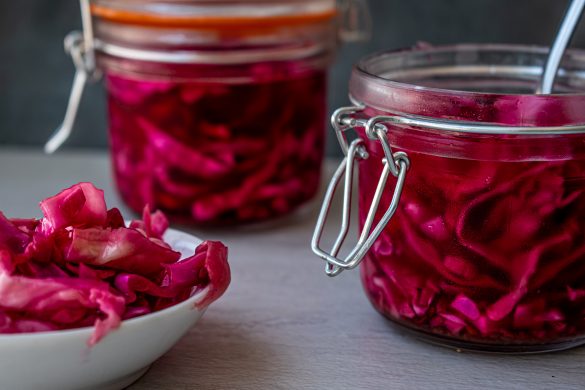
Besides those foods, you could also to play with fermented foods, such as sauerkraut, kimchi, or (coconut) kefir. These foods provide probiotics (living bacteria) and influence your microbiome directly. Studies have shown that fermented foods can have a variety of health benefits, as they can increase antioxidant and anti-inflammatory activity of your body, improve glycemic control, reduce intestinal permeability, and support mental health – to name just a few (Selhub et al., 2014; Melini et al., 2019; Voidarou et al., 2021). If you consider eating sauerkraut, you can either prepare it by yourself or buy it from a (health food) store – but make sure it is not pasteurized and sold in its fresh state (in the fridge section), because the health promoting bacteria do not survive the process of pasteurization.
I do not recommend taking any probiotic supplement straight away, only after consulting a medical expert. There are a lot of (low quality) supplements on the market and depending on your digestive condition they may even harm you more than doing good.
To summarize this paragraph:
- The primary source for a healthy gut microbiome are the foods you eat, as the fiber acts as a so-called prebiotic which feeds your healthy bacteria.
- Secondly, you can benefit from microbes on your unwashed fresh foods as well as sprouted produce, or even consider including fermented foods in your diet.
- And thirdly, if needed and only in consultation with a physician, you may include a probiotic supplement into your diet.
~ 4. Support elimination ~

Let’s get into the dirty stuff: elimination. Having regular bowel movements is essential if you want to avoid bloating, cramping, discomfort, and gas. Constipation is a chronic “dis-ease” that nobody talks about. Most of the digestive comfort is created when we do not eliminate properly, and old waste matter is backing up in the gastrointestinal tract. Just as I said in the beginning: Everyone is talking about what/how much/how often you put food in your body. But nobody is talking about what/how much is coming out of your body. – Isn’t it weird?
I want to give you a few tips on how you can support proper and regular elimination:
- Hydration is key for moving the food through your intestines. Water in combination with fiber (which soaks up the liquid) allows proper transportation – from one end to the other. When you eat raw fresh fruits and vegetables, you already take in a good amount of water as well as fiber. My tip for you is to drink water (if desired with lemon/lime juice) first thing in the morning to re-hydrate your body after the night period and to support getting your bowels moving.
 Besides the morning water and raw plant foods, you can try out vegetable juices, e.g. celery, cucumber, or beetroot juice. They don’t contain any insoluble fiber (the ‘bulky’ fiber) anymore, but the water-soluble fiber is still in there. Those juices also kick-start your digestion and are extremely easy to digest.
Besides the morning water and raw plant foods, you can try out vegetable juices, e.g. celery, cucumber, or beetroot juice. They don’t contain any insoluble fiber (the ‘bulky’ fiber) anymore, but the water-soluble fiber is still in there. Those juices also kick-start your digestion and are extremely easy to digest.- Deep belly breathing, especially with a long exhalation, allows your body to relax as you activate the parasympathetic nervous system. Take some time in the morning, the evening, and if possible, before/after every meal to take some deep breaths into your belly and exhale for an extended period of time.
- Soft and gentle belly massages with light pressure can help and stimulate the natural bowel movement (peristalsis). You want to start at the right bottom of your belly and move up toward your mid-abdomen, then turn left across the upper belly, and down along the left abdomen. This is the direction of your colon transporting the chyme toward the anus.
- Take time for going to the bathroom, preferably same time every day. For most people, the best time is in the morning – before your (busy) day starts. As you remember: Your body is an inseparable part of nature and it loves routines, it works in cycles, without any pressure or stress. Just by itself. Honor and appreciate your body for how it works and plan out for making your bathroom time a priority every day.
~ 5. Lifestyle: Move & Rest ~
The way you live drastically affects how you digest your food, because digestion is controlled by the nervous system – and so is everything you think and do.
- Living in a highly stressed state all the time, whether physically or mentally/emotionally, brings you constantly in fight-or-flight mode which compromises your digestive function drastically. The sympathetic nervous system gets stimulated and it blocks proper digestion.
- On the other hand: If you live a more balanced life, feel relaxed and happy, you will also digest your meals well. This is because the feeling of safety and relaxation activates the parasympathetic nervous system which literally brings you into a state of “rest and digest”.

At the end of the day, we want to find a healthy balance between being active and relaxed.
You do not want to stress your body too much, but regular physical activity is key for keeping your digestion in flow. It increases circulation, oxygenation, it supports movement of the lymphatic system as well as the intestines. Thus, physical activity boosts your digestion. Regular walks and a little bit of yoga might be perfectly enough for one person, whereas another person prefers going to the gym a few times a week, and a third person enjoys running and joining hot yoga classes. Whatever kind of movement makes you feel good in your body – go for it!
On the other hand, physical and mental rest is equally as important as movement. Yes, I want to emphasize the mental (and emotional) side of rest, because your mind can stress you as much as physical stress on the body – or even more. Especially nowadays, where many people live a more sedentary lifestyle, they tend to get stressed out more by their minds than their bodies.
Here I have a few tips for you on how you can welcome more relaxation into your daily life:

- First and foremost, you want to prioritize sleep – one of the greatest tools to allow body and mind to recover deeply.
- The holistic practice of yoga (breathwork, asanas, meditation) is my number one recommendation for everyone, not only to grow spiritually, but to come back into a physical state of deep relaxation and peace.
- While eating, you want to become mindful and eat without any distractions. Be present with your meal, bless your food, and take a couple deep breaths before eating.
~ Conclusion: Healthy Gut = Healthy Body ~

Eastern medicine already knew this for a very long time: A healthy digestive system is the key for optimal health. The digestive tract is interconnected with all metabolic processes and therefore functions of the body. What you put in there as well as how you think and feel about the food affects you on a holistic level.
Digestion is a very sensitive and for most people a taboo topic – nobody really enjoys talking about it. However, if you seek for optimal health, if you struggle with gut issues or any other related problem, it is key to address your digestive health. I myself wouldn’t be so passionate about this topic and address it so openly, if I hadn’t gone through so much combat with my own digestion. My personal experiences taught me that this needs to become a more natural and important topic we all talk about – especially when it comes to health and disease.
“A good digestion turneth all to health.”
(George Herbert)
I invite you to feel into my five holistic gut health tips and see what resonates with you. Give them a go and let me know how those (little) changes make your body and mind feel – holistically.
Thank you for being here, beautiful…
… and for committing to become the healthiest version of your Self.
I’m sending you love & peace – right from my heart.
Namasté,
yours Isabel!
Literature
Melini et al. (2019). Health-Promoting Components in Fermented Foods: An Up-to-Date Systematic Review. Nutrients. 2019 May; 11(5): 1189.
Selhub et al., (2014). Fermented foods, microbiota, and mental health: ancient practice meets nutritional psychiatry. J Physiol Anthropol. 2014; 33(1): 2.
Venegas et al. (2019). Short Chain Fatty Acids (SCFAs)-Mediated Gut Epithelial and Immune Regulation and Its Relevance for Inflammatory Bowel Diseases. Front. Immunol., 11.
Voidarou et al. (2021). Fermentative Foods: Microbiology, Biochemistry, Potential Human Health Benefits and Public Health Issues. Foods. 2021 Jan; 10(1): 69.
Pictures
Unsplash (www.unsplash.com)
Disclaimer: All information and content on this blog is presented for informational purposes only. It is not a substitute for medical advice, diagnosis, treatment, or prescribing. The content provided is based on research, ancient wisdom (Ayurveda), and practices based particularly on my own experiences. As a nutritional expert (M.Sc.), holistic health coach, plant-based enthusiast, yoga and meditation teacher, I share my knowledge and experiences as I invite you to go for what resonates with you. I’m furthermore honored to guide and support you along your health and spiritual journey.
